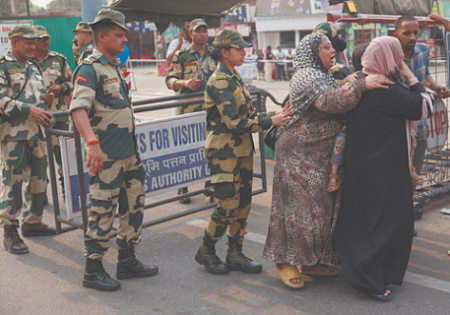
Pakistan has resorted to a show of force amid escalating tensions with India in Kashmir. He tested a ballistic missile with a range of 450 km. According to experts, the rocket landed either in a desert area of Pakistan or in the Arabian Sea, that is, not in India. And in Kashmir, the sides fired towards each other, but not at close range, trying to avoid an expansion of the conflict. After all, India and Pakistan have met on the battlefield three times and do not want a new war. The problem is that Islamabad does not recognize its responsibility for the fact that terrorists are hiding in the land it controls.
Pakistan and India began the battle for Kashmir back in 1947, after Britain divided its colony on the Indian Subcontinent into two states – India and Pakistan.
The reason for the fight was the colony’s management system, established by London. In many regions, the maharajas were the supreme rulers, and it was easy for Britain to put pressure on them. This is how Kashmir was governed. The Maharaja was a Hindu, and the majority of the population professes Islam. At that time, Pakistan did not seek the consent of Delhi, formed a “militia” and moved it to the main city of Kashmir, Srinagar. Delhi was forced to transfer regular army units to Kashmir.
During that period, as well as after the second India-Pakistan war, a line of actual control was formed, replacing the border. Moreover, each side proves that it has the right to own all of Kashmir. This is the background of the tragedy that took place in Kashmir near the town of Pahalgam on April 22.
The militants, who probably had a base in the Pakistani part of Kashmir, penetrated through the ceasefire line replacing the border and killed 26 tourists. This crime caused a wave of outrage in India. On social media, people are demanding that Pakistan be roughly punished.
In this heated atmosphere, Islamabad’s statement that it is ready to agree to an impartial investigation of the terrorist attack is difficult to take seriously. A much more significant sign of Pakistan’s policy was the test of a new missile. They do not say whether it is capable of carrying a nuclear charge. But since both India and Pakistan have nuclear weapons arsenals, the missile test takes on an ominous connotation. According to the AP news agency, commentators in both countries are sounding the alarm: could it really come to the worst?
The Pakistani Defense Ministry said that the launch of the Abdali missile system was caused by the need to check how ready the troops were for its use and to test navigation equipment. President of Pakistan Asif Ali Zardari and Prime Minister Shahbaz Sharif congratulated the test participants on their success. This gesture, as well as the fact that the new missile is named after Abdali, the famous Muslim conqueror of India many centuries ago, serves as evidence that Islamabad is not only unwilling to at least partially take the blame for the murder, but is ready to fan nationalist sentiments among its citizens.
Syed Ali, a military expert based in Islamabad, tried to justify the militant statements of the Pakistani leaders. He said that Pakistani intelligence allegedly has evidence of India’s intention to strike. On the other hand, his comment partly explains why Islamabad threatened to launch a missile attack on India. The reason for Pakistan’s sharp reaction is that India has begun to block Pakistan’s access to the waters of the Indus River. An agreement reached in the last century allowed Pakistani farmers to irrigate their fields with the waters of one of the tributaries of the Indus. After the terrorist attack, the traces of which lead to Pakistan, India began using floodgates to reduce the flow of water flowing into Pakistan.
In turn, India has identified Pakistan’s connection with the organizers of the terrorist attack in Pahalgam. A preliminary report from India’s National Investigation Agency (NIA) indicates an operational link between Pakistan’s Interagency Intelligence and the terrorist group Lashkar-e-Taiba (banned in Russia), which developed the attack. This was reported by the Indian NDTV channel, citing sources in NIA.
Diplomats of both countries and ordinary travelers felt the consequences of the attack on tourists. Delhi and Islamabad exchanged expulsions of part of the diplomatic staff. India has cancelled visas issued to Pakistanis to visit the country. Given that members of the same family often live on both sides of the conditional border, this has become an obstacle to their communication.
Nevertheless, at the crossing point between the two states in the Wagah area, as before, a flag lowering ceremony was held. A long-established ritual was performed by the border guards of Pakistan and India.
What does it mean? The New York Times interviewed a number of Pakistani citizens. Her conclusion: Pakistanis have many life problems – high cost, blocking roads by police and the army in places where separatists or fanatical jihadists operate. That’s why the younger generation, especially university students, says, “War is the last thing we need, we don’t want it.”
And what is the reaction of the world powers? Russia has called for a diplomatic solution to the conflict. The killing of tourists in Kashmir has already affected the schedule of Indian politicians’ overseas tours. Neither Indian Prime Minister Narendra Modi nor Defense Minister Rajnath Singh will come to Moscow for the Victory Day Parade. India will be represented by Deputy Defense Minister Sanjay Seth. The reason, according to the Indian media, is precisely that in Kashmir, after the murder of tourists by militants, there are shootings, politicians of both states exchange threatening statements. And Modi, forced to take into account the sentiments of his electorate, seeks to condemn Pakistan at the UN and other international forums.
